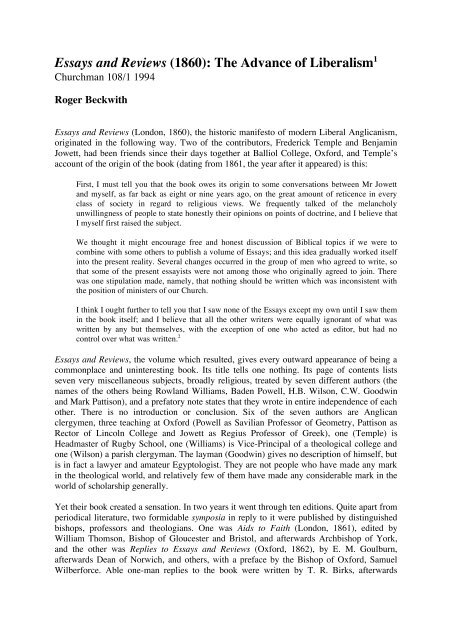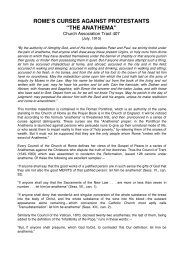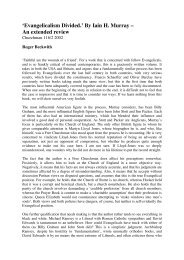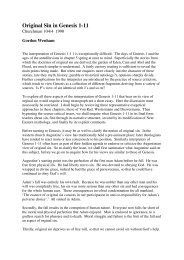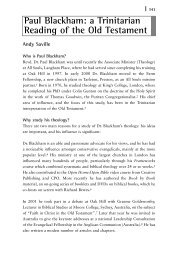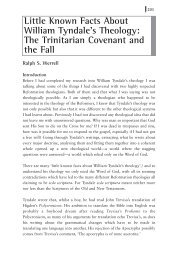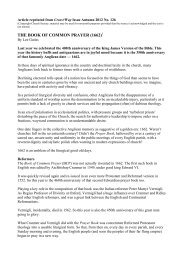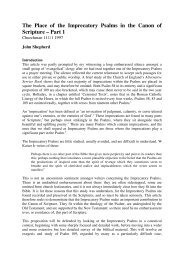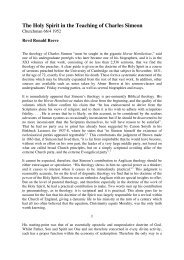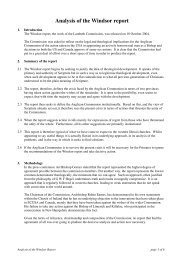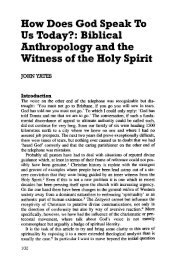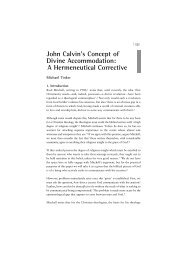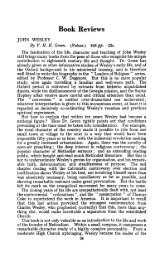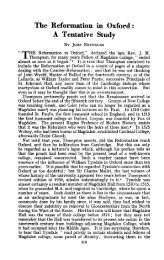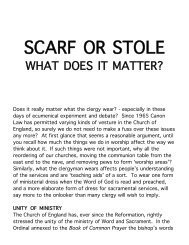Essays and Reviews (1860): The Advance of ... - Church Society
Essays and Reviews (1860): The Advance of ... - Church Society
Essays and Reviews (1860): The Advance of ... - Church Society
You also want an ePaper? Increase the reach of your titles
YUMPU automatically turns print PDFs into web optimized ePapers that Google loves.
<strong>Essays</strong> <strong>and</strong> <strong>Reviews</strong> (<strong>1860</strong>): <strong>The</strong> <strong>Advance</strong> <strong>of</strong> Liberalism 1<br />
<strong>Church</strong>man 108/1 1994<br />
Roger Beckwith<br />
<strong>Essays</strong> <strong>and</strong> <strong>Reviews</strong> (London, <strong>1860</strong>), the historic manifesto <strong>of</strong> modern Liberal Anglicanism,<br />
originated in the following way. Two <strong>of</strong> the contributors, Frederick Temple <strong>and</strong> Benjamin<br />
Jowett, had been friends since their days together at Balliol College, Oxford, <strong>and</strong> Temple’s<br />
account <strong>of</strong> the origin <strong>of</strong> the book (dating from 1861, the year after it appeared) is this:<br />
First, I must tell you that the book owes its origin to some conversations between Mr Jowett<br />
<strong>and</strong> myself, as far back as eight or nine years ago, on the great amount <strong>of</strong> reticence in every<br />
class <strong>of</strong> society in regard to religious views. We frequently talked <strong>of</strong> the melancholy<br />
unwillingness <strong>of</strong> people to state honestly their opinions on points <strong>of</strong> doctrine, <strong>and</strong> I believe that<br />
I myself first raised the subject.<br />
We thought it might encourage free <strong>and</strong> honest discussion <strong>of</strong> Biblical topics if we were to<br />
combine with some others to publish a volume <strong>of</strong> <strong>Essays</strong>; <strong>and</strong> this idea gradually worked itself<br />
into the present reality. Several changes occurred in the group <strong>of</strong> men who agreed to write, so<br />
that some <strong>of</strong> the present essayists were not among those who originally agreed to join. <strong>The</strong>re<br />
was one stipulation made, namely, that nothing should be written which was inconsistent with<br />
the position <strong>of</strong> ministers <strong>of</strong> our <strong>Church</strong>.<br />
I think I ought further to tell you that I saw none <strong>of</strong> the <strong>Essays</strong> except my own until I saw them<br />
in the book itself; <strong>and</strong> I believe that all the other writers were equally ignorant <strong>of</strong> what was<br />
written by any but themselves, with the exception <strong>of</strong> one who acted as editor, but had no<br />
control over what was written. 2<br />
<strong>Essays</strong> <strong>and</strong> <strong>Reviews</strong>, the volume which resulted, gives every outward appearance <strong>of</strong> being a<br />
commonplace <strong>and</strong> uninteresting book. Its title tells one nothing. Its page <strong>of</strong> contents lists<br />
seven very miscellaneous subjects, broadly religious, treated by seven different authors (the<br />
names <strong>of</strong> the others being Rowl<strong>and</strong> Williams, Baden Powell, H.B. Wilson, C.W. Goodwin<br />
<strong>and</strong> Mark Pattison), <strong>and</strong> a prefatory note states that they wrote in entire independence <strong>of</strong> each<br />
other. <strong>The</strong>re is no introduction or conclusion. Six <strong>of</strong> the seven authors are Anglican<br />
clergymen, three teaching at Oxford (Powell as Savilian Pr<strong>of</strong>essor <strong>of</strong> Geometry, Pattison as<br />
Rector <strong>of</strong> Lincoln College <strong>and</strong> Jowett as Regius Pr<strong>of</strong>essor <strong>of</strong> Greek), one (Temple) is<br />
Headmaster <strong>of</strong> Rugby School, one (Williams) is Vice-Principal <strong>of</strong> a theological college <strong>and</strong><br />
one (Wilson) a parish clergyman. <strong>The</strong> layman (Goodwin) gives no description <strong>of</strong> himself, but<br />
is in fact a lawyer <strong>and</strong> amateur Egyptologist. <strong>The</strong>y are not people who have made any mark<br />
in the theological world, <strong>and</strong> relatively few <strong>of</strong> them have made any considerable mark in the<br />
world <strong>of</strong> scholarship generally.<br />
Yet their book created a sensation. In two years it went through ten editions. Quite apart from<br />
periodical literature, two formidable symposia in reply to it were published by distinguished<br />
bishops, pr<strong>of</strong>essors <strong>and</strong> theologians. One was Aids to Faith (London, 1861), edited by<br />
William Thomson, Bishop <strong>of</strong> Gloucester <strong>and</strong> Bristol, <strong>and</strong> afterwards Archbishop <strong>of</strong> York,<br />
<strong>and</strong> the other was Replies to <strong>Essays</strong> <strong>and</strong> <strong>Reviews</strong> (Oxford, 1862), by E. M. Goulburn,<br />
afterwards Dean <strong>of</strong> Norwich, <strong>and</strong> others, with a preface by the Bishop <strong>of</strong> Oxford, Samuel<br />
Wilberforce. Able one-man replies to the book were written by T. R. Birks, afterwards
Pr<strong>of</strong>essor <strong>of</strong> Moral <strong>The</strong>ology at Cambridge, under the title <strong>The</strong> Bible <strong>and</strong> Modern Thought<br />
(London, 1861); by Edward Garbett, in his first series <strong>of</strong> Boyle Lectures, <strong>The</strong> Bible <strong>and</strong> its<br />
Critics (London, 1861); <strong>and</strong> by J. W. Burgon, afterwards Dean <strong>of</strong> Chichester, in his famous<br />
book Inspiration <strong>and</strong> Interpretation (Oxford, 1861), the first half <strong>of</strong> which, in the original<br />
edition, was a reply to <strong>Essays</strong> <strong>and</strong> <strong>Reviews</strong>. Some <strong>of</strong> the respondents were Evangelicals, but<br />
many were High <strong>Church</strong>men <strong>of</strong> the old school. <strong>The</strong> notoriety <strong>of</strong> the book spread outside<br />
Engl<strong>and</strong> <strong>and</strong> outside Anglicanism: replies were written by two overseas bishops, Bishop<br />
Parsons <strong>of</strong> Meath <strong>and</strong> Bishop McIlvaine <strong>of</strong> Ohio, <strong>and</strong> by two distinguished non-Anglicans,<br />
James Buchanan, the Free <strong>Church</strong> <strong>of</strong> Scotl<strong>and</strong> theologian, <strong>and</strong> J. N. Darby, the leader <strong>of</strong> the<br />
Plymouth Brethren.<br />
<strong>The</strong> matter was not allowed to rest at the literary level. Protests <strong>and</strong> addresses were drawn up<br />
by the clergy <strong>and</strong> widely signed, <strong>and</strong> in response to these a pastoral letter condemning certain<br />
opinions in the book was issued by the Archbishop <strong>of</strong> Canterbury (Sumner) <strong>and</strong> the<br />
episcopate <strong>of</strong> Engl<strong>and</strong> <strong>and</strong> Irel<strong>and</strong>. Proceedings were begun in Convocation, <strong>and</strong> were only<br />
suspended while two <strong>of</strong> the ordained essayists, Rowl<strong>and</strong> Williams <strong>and</strong> H. B. Wilson, were<br />
tried for heresy. In the Court <strong>of</strong> Arches they were each convicted on three counts, <strong>and</strong><br />
suspended from their duties for one year, but on appeal to the Privy Council they were<br />
acquitted, the Archbishops <strong>of</strong> Canterbury <strong>and</strong> York (Longley <strong>and</strong> Thomson) dissenting. After<br />
their acquittal, which was in 1864 <strong>and</strong> was on the grounds that the charges were not<br />
sufficiently proved for a criminal action, the proceedings in Convocation were revived <strong>and</strong><br />
<strong>Essays</strong> <strong>and</strong> <strong>Reviews</strong> was synodically condemned in July 1864 by both houses.<br />
Yet the acquittal was not without its effect. It had shown that Liberalism could not easily be<br />
controlled by legal action, a fact which later became clear with regard to Anglo-Catholicism<br />
also. From being an outrage, negative Liberalism became a tolerated evil <strong>and</strong> then a<br />
legitimate option. As early as 1869, Frederick Temple, the author <strong>of</strong> the opening essay in the<br />
book (admittedly the most innocuous one), was appointed a bishop, <strong>and</strong> by the end <strong>of</strong> the<br />
century he had become Archbishop <strong>of</strong> Canterbury.<br />
What, then, does this remarkable book contain <strong>The</strong> first essay, by Frederick Temple, is<br />
entitled ‘<strong>The</strong> Education <strong>of</strong> the World’, <strong>and</strong> is a form <strong>of</strong> the old comparison between the<br />
progress <strong>of</strong> revelation <strong>and</strong> the growth <strong>of</strong> a human being. It is particularly reminiscent <strong>of</strong><br />
Lessing’s essay ‘<strong>The</strong> Education <strong>of</strong> the Human Race’. <strong>The</strong> three stages in human life, <strong>of</strong><br />
obedience in childhood, example in adolescence <strong>and</strong> responsible freedom in adulthood, are<br />
paralleled with the periods <strong>of</strong> the Law, the Gospels <strong>and</strong> Pentecost. In this last period, the<br />
period <strong>of</strong> the Spirit, man is come <strong>of</strong> age, Temple claims, <strong>and</strong> he must be free to make his own<br />
decisions <strong>and</strong> draw lessons, as he deems fit, or as his conscience dictates, from all worthy<br />
sources, though chiefly from the Bible. As Goulburn points out in his reply, sin <strong>and</strong><br />
redemption do not seem to feature in the author’s scheme. <strong>The</strong> implied optimism about<br />
human nature has been characteristic <strong>of</strong> Liberalism ever since, <strong>and</strong> the vague idea <strong>of</strong> man<br />
now come <strong>of</strong> age, which today we associate with Bonhoeffer <strong>and</strong> John Robinson, is<br />
obviously a notion with a history behind it.<br />
<strong>The</strong> second essay, by Rowl<strong>and</strong> Williams, is entitled ‘Bunsen’s Biblical Researches’. <strong>The</strong><br />
dependence on current German scholarship now becomes obvious, but the shallowness <strong>of</strong> the<br />
writer’s acquaintance with it soon becomes equally clear. <strong>The</strong> Chevalier Bunsen is not an<br />
important figure in the history <strong>of</strong> German biblical criticism. John Rogerson’s informative<br />
book Old Testament Criticism in the Nineteenth Century: Engl<strong>and</strong> <strong>and</strong> Germany (London:<br />
S.P.C.K., 1984) devotes a chapter to him only because <strong>of</strong> the attention he received in
Engl<strong>and</strong>. Williams, however, regards his work as epoch-making, <strong>and</strong> for this reason devotes<br />
his essay to Bunsen alone. <strong>The</strong> main point <strong>of</strong> his essay is to endorse Bunsen’s scepticism<br />
about predictive prophecy, especially messianic prophecy, <strong>and</strong> to declare the Book <strong>of</strong> Daniel<br />
a product <strong>of</strong> the time <strong>of</strong> Antiochus Epiphanes, in the second century BC, not the sixth,<br />
containing only prophecies after the event.<br />
<strong>The</strong> third essay, by Baden Powell (father <strong>of</strong> the founder <strong>of</strong> the Scout <strong>and</strong> Guide movement),<br />
is entitled ‘On the Study <strong>of</strong> the Evidences <strong>of</strong> Christianity’. It concentrates mainly on the<br />
evidential value <strong>of</strong> miracles, <strong>and</strong> does for miracles what the previous essay does for<br />
predictive prophecy, viz., declares them incredible. This is because they are contrary to the<br />
uniformity <strong>of</strong> nature. In passing, it pays glowing tribute to Darwin’s <strong>The</strong> Origin <strong>of</strong> Species,<br />
then newly published, because <strong>of</strong> its testimony to the ‘self-evolving powers <strong>of</strong> nature’.<br />
Powell did not live to read the formidable refutation <strong>of</strong> his essay by the philosopher H. L.<br />
Mansel in Aids to Faith.<br />
<strong>The</strong> fourth essay, by H. B. Wilson, bears the curious title ‘Séances Historiques de Genève—<br />
the National <strong>Church</strong>’. It begins by speaking <strong>of</strong> a recent controversy between two lecturers in<br />
a series <strong>of</strong> public addresses delivered at Geneva, one <strong>of</strong> whom attacked <strong>and</strong> the other<br />
defended the principle <strong>of</strong> ‘multitudinism’, that is, <strong>of</strong> a national, established church. Wilson<br />
sides with the defender, but this is not the real point <strong>of</strong> his essay, which is to maintain that the<br />
moral principles <strong>of</strong> Christianity are more important than its doctrinal principles, <strong>and</strong> that, for<br />
a national church to apply doctrinal tests, is really contrary to its national character. His essay<br />
thus resolves itself into an attack upon the requirement <strong>of</strong> subscription to the 39 Articles, <strong>and</strong><br />
upon its basis in the doctrinal authority <strong>of</strong> the Bible.<br />
<strong>The</strong> fifth essay, by the one lay essayist C. W. Goodwin, is entitled ‘On the Mosaic<br />
Cosmogony’. It deals with the first chapter <strong>of</strong> Genesis, which it regards as simply a<br />
speculation about the origin <strong>of</strong> the world by a powerful but primitive mind. It rejects the<br />
explanation that the first verse <strong>of</strong> Genesis covers a long period <strong>of</strong> time, prior to the six days,<br />
or that the six days themselves correspond to long periods <strong>of</strong> time—one or other <strong>of</strong> which<br />
hypotheses is nevertheless defended by most <strong>of</strong> those who answer the essay. Gilbert Rorison,<br />
however, who answers the essay in Replies to <strong>Essays</strong> <strong>and</strong> <strong>Reviews</strong>, holds that Genesis 1 is a<br />
sort <strong>of</strong> psalm <strong>of</strong> creation, a narrative written in poetic picture-language, with a poetic parallel<br />
structure, in which the events <strong>of</strong> the first three days <strong>and</strong> the second three days correspond.<br />
This is an example <strong>of</strong> the so-called ‘schematic’ interpretation, favoured by many conservative<br />
commentators today.<br />
<strong>The</strong> sixth essay, by Mark Pattison, is entitled ‘Tendencies <strong>of</strong> Religious Thought in Engl<strong>and</strong>,<br />
1688-1750’, <strong>and</strong> recalls the period <strong>of</strong> the Latitudinarians <strong>and</strong> the Deists, when reason had a<br />
rather more prominent role in theology than it has had since the Evangelical Revival <strong>and</strong> the<br />
Oxford Movement.<br />
<strong>The</strong> seventh <strong>and</strong> last essay, by Benjamin Jowett, is entitled ‘On the Interpretation <strong>of</strong><br />
Scripture’. Despite the author’s linguistic ability, Burgon reckoned this the most mischievous<br />
essay <strong>of</strong> the seven, because the most explicit in its disbelief that the Bible is the word <strong>of</strong> God.<br />
It contends, in words still familiar today, that the Bible should be read <strong>and</strong> interpreted ‘like<br />
any other book’, <strong>and</strong> more especially like any other ancient book. <strong>The</strong> Bible’s teaching is not<br />
readily applicable to later times, <strong>and</strong> the author is rather scornful <strong>of</strong> the Fathers <strong>and</strong> later<br />
theologians as interpreters <strong>of</strong> the Bible. He is sceptical about inspiration, <strong>and</strong> is especially
insistent that arguments must not be rested upon single words <strong>of</strong> Scripture, failing to note that<br />
this <strong>of</strong>ten happens in the New Testament itself.<br />
Such are the contents <strong>of</strong> this much-discussed book. Though the authors pr<strong>of</strong>essedly wrote<br />
independently <strong>of</strong> each other, one can hardly fail to see that they have an agreed approach.<br />
<strong>The</strong>ir main subject-matter is the Bible, <strong>and</strong> their main contention is the need to subject the<br />
Bible to the scrutiny <strong>of</strong> autonomous reason. Even the chapters on miracles <strong>and</strong> on<br />
subscription to the Articles are really only dealing with the Bible at one remove, <strong>and</strong> the<br />
opening essay says explicitly, in its concluding summary, ‘<strong>The</strong> immediate work <strong>of</strong> our day is<br />
the study <strong>of</strong> the Bible’.<br />
<strong>Essays</strong> <strong>and</strong> <strong>Reviews</strong> proved to be a watershed. A new trend in English study <strong>of</strong> the Bible<br />
began then, which increased in strength as time went on, <strong>and</strong> became dominant, as it still is.<br />
Only two years after the book appeared, a practical example <strong>of</strong> its principles was issued by<br />
Bishop Colenso <strong>of</strong> Natal, who in 1862 published at London the first part <strong>of</strong> his book <strong>The</strong><br />
Pentateuch <strong>and</strong> Book <strong>of</strong> Joshua critically examined. Six further parts were to follow.<br />
It would, <strong>of</strong> course, be a mistake to think that the Bible was not studied in Engl<strong>and</strong> prior to<br />
<strong>1860</strong>: it was. Some account <strong>of</strong> this study is given by Rogerson in chs. 11-14 <strong>of</strong> his book,<br />
already cited. Yet the amount <strong>of</strong> study was limited, compared with what had been happening<br />
in Germany. Germany, <strong>of</strong> course, was a much larger country, but the difference was not just<br />
due to this. As Rogerson points out, 3 the only faculties <strong>of</strong> theology where the Bible was<br />
taught in Engl<strong>and</strong>, up to about 1830, were at Oxford <strong>and</strong> Cambridge, to which those at King’s<br />
College, London, <strong>and</strong> at Durham, were then added. By contrast, for most <strong>of</strong> the years 1800-<br />
<strong>1860</strong>, the Bible was taught at seventeen Protestant faculties in the German states. A second<br />
contrast is that most <strong>of</strong> the teaching given in Germany was extremely free-thinking in<br />
character, whereas conservative views prevailed in Engl<strong>and</strong>. Even Liberal churchmen at this<br />
period treated the Bible with reverence, <strong>and</strong> some <strong>of</strong> them, such as Bp. Thirlwall, were<br />
deeply shocked by <strong>Essays</strong> <strong>and</strong> <strong>Reviews</strong> when it appeared. In the first volume <strong>of</strong> Liddon’s Life<br />
<strong>of</strong> Pusey, chapters 4, 5 <strong>and</strong> 8, there is a vivid <strong>and</strong> fascinating account <strong>of</strong> the first impact<br />
which German biblical scholarship made on the universities <strong>of</strong> Oxford <strong>and</strong> Cambridge. This<br />
was in the 1820s. <strong>The</strong> brothers Hugh James <strong>and</strong> Henry John Rose were two <strong>of</strong> the first at<br />
Cambridge to investigate it, <strong>and</strong> in 1825 the former delivered four discourses there on ‘<strong>The</strong><br />
State <strong>of</strong> the Protestant Religion in Germany’, which were published at Cambridge the same<br />
year, dedicated to Bp. Blomfield. Rose was very alarmed at what he had learned. At Oxford<br />
in this period there were only two people who understood German, <strong>and</strong>, though some<br />
theology in both countries was still being written in Latin, the vernacular was becoming<br />
normal; so the Regius Pr<strong>of</strong>essor <strong>of</strong> Divinity, Charles Lloyd, decided the same year (1825) to<br />
send a promising young graduate, E. B. Pusey, then twenty-four years old, to study in<br />
Germany for a year, after which a second year followed. He studied under many great<br />
names—Eichhorn, Schleiermacher, Ne<strong>and</strong>er, Ewald, Tholuck <strong>and</strong> Hengstenberg, among<br />
others—<strong>and</strong> spent his time acquainting himself with German theology <strong>and</strong> deepening his<br />
knowledge <strong>of</strong> Semitic languages (Hebrew, Aramaic, Syriac <strong>and</strong> Arabic). As Pusey recalled<br />
years later,<br />
I can remember the room in Göttingen in which I was sitting when the real condition <strong>of</strong><br />
religious thought in Germany flashed upon me. I said to myself, ‘This will all come upon us in<br />
Engl<strong>and</strong>; <strong>and</strong> how utterly unprepared for it we are!’ From that time I determined to devote<br />
myself more earnestly to the Old Testament, as the field in which Rationalism seemed to be<br />
most successful. 4
Such was Pusey’s progress in his studies, that in 1828, the year after his return to Oxford, he<br />
was appointed Regius Pr<strong>of</strong>essor <strong>of</strong> Hebrew, <strong>and</strong> this was the academic post which he held<br />
right up to his death in 1882, when he was succeeded by S. R. Driver, a scholar <strong>of</strong> very<br />
different views. Pusey is much better known today for his activities in another field, as a<br />
pioneer <strong>of</strong> the Oxford Movement, which aimed to accentuate (<strong>and</strong> indeed to exaggerate) the<br />
traditionalism <strong>of</strong> the <strong>Church</strong> <strong>of</strong> Engl<strong>and</strong>, <strong>and</strong> to resist the reforming zeal <strong>of</strong> those mildly<br />
Liberal churchmen <strong>and</strong> politicians who were so active in the first half <strong>of</strong> the nineteenth<br />
century. Our concern, however, is with Pusey’s labours as an Old Testament scholar, <strong>and</strong> in<br />
this field his great work was occasioned by <strong>Essays</strong> <strong>and</strong> <strong>Reviews</strong>. In <strong>Essays</strong> <strong>and</strong> <strong>Reviews</strong>,<br />
Pusey’s early premonition <strong>of</strong> what was coming upon Engl<strong>and</strong> was at last, after more than<br />
thirty years, realized: Liberalism, under German influence, had now become aggressive <strong>and</strong><br />
destructive in Engl<strong>and</strong>, <strong>and</strong> had been espoused by ordained members <strong>of</strong> the established<br />
church. And even at this date there was no one in Engl<strong>and</strong> so well qualified by his studies <strong>and</strong><br />
experience to answer it on its own ground as Pusey. We have spoken earlier <strong>of</strong> what was<br />
written in reply to <strong>Essays</strong> <strong>and</strong> <strong>Reviews</strong>, but have yet to mention Pusey’s Lectures on Daniel<br />
the Prophet, which were delivered at Oxford in 1862 <strong>and</strong> 1863 <strong>and</strong> were published at Oxford,<br />
as a thick book full <strong>of</strong> varied learning, in 1864. <strong>The</strong> opening words <strong>of</strong> the preface read,<br />
<strong>The</strong> following lectures were planned, as my contribution against that tide <strong>of</strong> scepticism, which<br />
the publication <strong>of</strong> the ‘<strong>Essays</strong> <strong>and</strong> <strong>Reviews</strong>’ let loose upon the young <strong>and</strong> uninstructed.<br />
And the opening words <strong>of</strong> the first lecture are these,<br />
<strong>The</strong> book <strong>of</strong> Daniel is especially fitted to be a battlefield between faith <strong>and</strong> unbelief. It admits<br />
<strong>of</strong> no half-measures. It is either Divine or an imposture.<br />
Such frank language is not in fashion today. Anglo-Catholics long ago ab<strong>and</strong>oned Pusey’s<br />
attitude to the Bible, <strong>and</strong> Evangelicals <strong>of</strong>ten today (more <strong>of</strong>ten than a few years back) endorse<br />
theories stemming from rationalistic biblical criticism without expecting their faith to be<br />
injured as a consequence. <strong>The</strong> ‘accepted results’ <strong>of</strong> critical study tend to be taken for granted<br />
as a basis for one’s own further study, <strong>and</strong> radical questions are rarely asked about them.<br />
When they are asked, <strong>and</strong> in a public manner, the presumption is against those who ask them,<br />
<strong>and</strong> any attempt the questioners make to turn back the tide <strong>of</strong> critical opinion is disregarded,<br />
as self-evidently perverse. New ideas receive an open-minded reception, but attempts to<br />
revive old ideas are, not unnaturally, seen as simply reactionary.<br />
Yet it seems to me reasonable to suggest that the truth is not after all on the side <strong>of</strong> this sort <strong>of</strong><br />
biblical criticism, the sort championed by <strong>Essays</strong> <strong>and</strong> <strong>Reviews</strong>, but on the side <strong>of</strong> its<br />
opponents. <strong>The</strong>re are four reasons for suggesting this.<br />
1. <strong>The</strong> opposition did not quickly collapse (as discredited cases regularly do), either in<br />
Germany or in Engl<strong>and</strong>.<br />
In Germany, Tholuck opposed it, <strong>and</strong> Hengstenberg founded an opposition school <strong>of</strong><br />
conservative Old Testament criticism, in which the other great names were Hävernick, Kurtz,<br />
Keil <strong>and</strong> Delitzsch. In Engl<strong>and</strong>, opposition was maintained, in the <strong>Church</strong> <strong>of</strong> Engl<strong>and</strong> as well<br />
as outside, right up to the end <strong>of</strong> the century, <strong>and</strong> indeed until the First World War. 5 In the<br />
1890s, Eyre <strong>and</strong> Spottiswoode, the royal printers, published a series <strong>of</strong> informative <strong>and</strong> wellargued<br />
studies called the Bible Student’s Library, <strong>and</strong> also a volume even larger than Pusey’s
Lectures on Daniel the Prophet, maintaining the essentially Mosaic origin <strong>of</strong> the Pentateuch.<br />
This was Lex Mosaica, or the Law <strong>of</strong> Moses <strong>and</strong> the Higher Criticism (London, 1894), edited<br />
by Richard Valpy French, brother <strong>of</strong> the famous missionary bishop, <strong>and</strong> with many<br />
distinguished contributors. Like Pusey’s book, it argues a very powerful case. When<br />
eventually this school <strong>of</strong> thought did fade into the background in Engl<strong>and</strong>, it seems to have<br />
been due to fashion rather than to argument, <strong>and</strong> to the very imprudent assumption that the<br />
Old Testament could be safely surrendered, provided the New Testament was defended. In<br />
reality, the conservative case for the New Testament was then being maintained (by<br />
Lightfoot, Westcott <strong>and</strong> others) with the same sort <strong>of</strong> arguments as conservative Old<br />
Testament scholars were using, <strong>and</strong> the surrender <strong>of</strong> the Old Testament has since imperilled<br />
the New Testament as well.<br />
2. <strong>The</strong> origins <strong>of</strong> German biblical criticism are highly suspect.<br />
Attention has recently been drawn by H. G. Reventlow, in his learned book <strong>The</strong> Authority <strong>of</strong><br />
the Bible <strong>and</strong> the Rise <strong>of</strong> the Modern World (E. T., London, 1984), to the fact that negative<br />
biblical criticism did not begin with the German critics but with the English Deists. In its<br />
origins, it was not the result <strong>of</strong> German scholarship but <strong>of</strong> English scepticism. <strong>The</strong> Deists<br />
were a school <strong>of</strong> thought in the Engl<strong>and</strong> <strong>of</strong> the late seventeenth <strong>and</strong> early eighteenth century,<br />
who maintained a sort <strong>of</strong> natural theology which they thought could be justified by reason<br />
alone, <strong>and</strong> discarded whatever else the Bible teaches. <strong>The</strong>y ridiculed the supernatural. One <strong>of</strong><br />
the Deists, Anthony Collins, was the first writer since the Neo-Platonist philosopher<br />
Porphyry, in his book against Christianity in the third century, to claim that the Book <strong>of</strong><br />
Daniel was not really written until the persecution <strong>of</strong> the Jews by Antiochus Epiphanes in the<br />
second century BC, <strong>and</strong> contained only prophecies after the event (see Reventlow, p. 368).<br />
Yet this is now the accepted wisdom! 6 <strong>The</strong> writings <strong>of</strong> the Deists were translated into<br />
continental languages, <strong>and</strong> were promoted also from France, where Voltaire had been greatly<br />
influenced by the English Deist Bolingbroke, <strong>and</strong>, though refuted <strong>and</strong> discredited in Engl<strong>and</strong>,<br />
by the efforts <strong>of</strong> Bp. Joseph Butler <strong>and</strong> others, they acquired a following in Germany. <strong>The</strong>se<br />
facts were well understood in the mid-nineteenth century, both in Germany <strong>and</strong> in Engl<strong>and</strong>,<br />
but have since been conveniently forgotten, until Reventlow revived the knowledge <strong>of</strong> them.<br />
See C.F.A. Kahnis, Internal History <strong>of</strong> German Protestantism since the middle <strong>of</strong> last century<br />
(E. T., Edinburgh, 1856), <strong>and</strong> Alex<strong>and</strong>er McCaul, Rationalism <strong>and</strong> Deistic Infidelity<br />
(London, Wertheim, 1861), where McCaul quotes as his German authorities Stäudlin,<br />
Hagenbach, Weber, Tholuck <strong>and</strong> Guericke. Rogerson, in his book already several times cited,<br />
accepts from Reventlow this account <strong>of</strong> the Deistic origin <strong>of</strong> German biblical criticism, but he<br />
does not seem to realize its serious implications for the credibility <strong>of</strong> the movement he<br />
upholds. 7<br />
3. <strong>The</strong> eighteenth <strong>and</strong> nineteenth-century philosophical assumptions incorporated into<br />
German biblical criticism further undermine its claims to be objective <strong>and</strong> scientific.<br />
Between 1828 <strong>and</strong> 1830, Rose <strong>and</strong> Pusey had a friendly literary controversy on the reasons<br />
for the prevalence <strong>of</strong> rationalism in German theology. Among the reasons discerned was a<br />
reaction against the rigid confessional scholasticism <strong>of</strong> Lutheran theology in the seventeenth<br />
<strong>and</strong> early eighteenth centuries. In reaction against this, it appeared, both free-thinkers <strong>and</strong><br />
Pietists had effectively dispensed with confessions <strong>of</strong> faith, <strong>and</strong> in the case <strong>of</strong> the freethinkers<br />
this had led first to so-called ‘Neology’ [easy-going Modernism] <strong>and</strong> then to<br />
negative Rationalism, as rigid as the scholasticism which preceded it. By this stage, German<br />
theology had become thoroughly integrated with non-Christian philosophy, <strong>and</strong> there can be
little doubt which had the upper h<strong>and</strong>. Rationalism produced its own philosophical reactions,<br />
in the moralism <strong>of</strong> Kant, the experientialism <strong>of</strong> Schleiermacher <strong>and</strong> the pantheistic idealism<br />
attributed to Hegel, none <strong>of</strong> which ab<strong>and</strong>oned the earlier rationalism, but attempted to modify<br />
it. <strong>The</strong> German biblical critics <strong>of</strong> the late eighteenth <strong>and</strong> nineteenth centuries were trained<br />
under these influences, sometimes by the great philosophers in person, <strong>and</strong> it would be<br />
wonderful if the critics’ theories did not bear marks <strong>of</strong> the fact. Rogerson fully admits this.<br />
He writes,<br />
In the case <strong>of</strong> Old Testament scholarship, it can be said that in the nineteenth century, German<br />
scholars adopted philosophically orientated views <strong>of</strong> religion <strong>and</strong> theology that led them to<br />
propose radical reconstructions <strong>of</strong> the history <strong>of</strong> the Israelite religion based upon source<br />
criticism. 8<br />
<strong>The</strong> exact relationship between biblical criticism <strong>and</strong> philosophy cannot be known until it has<br />
been carefully investigated by someone equally well versed in the history <strong>of</strong> both, but in the<br />
meantime a substantial beginning has been made by Wayne Hankey in his learned essay ‘<strong>The</strong><br />
Bible in a Post-Critical Age’. 9 <strong>The</strong> sequence <strong>of</strong> the supposed documents in the Pentateuch,<br />
according to the accepted critical theory, provides an example <strong>of</strong> philosophical influence.<br />
J.F.L. George, the first critic to date the Priestly Document later than Deuteronomy, used the<br />
argument that the religion <strong>of</strong> the heart (in Deuteronomy) was a more basic kind <strong>of</strong> religion<br />
than the religion <strong>of</strong> the head (in the Priestly Document): this was precisely the view <strong>of</strong><br />
Schleiermacher, <strong>of</strong> whom George was at that stage in his life a devoted follower. 10 George’s<br />
contemporary J.K.W. Vatke, meanwhile, was an outspoken disciple <strong>of</strong> Hegel, <strong>and</strong> Hegel<br />
taught that religion is constantly evolutionary, from the lower to the higher: on this basis,<br />
Vatke was able to maintain a similar order to George’s, though for different reasons, holding<br />
that stress on holiness, cultic ritual <strong>and</strong> divine transcendence, as in the Priestly Document,<br />
belongs to the last <strong>and</strong> highest stage <strong>of</strong> Israel’s religion. 11 <strong>The</strong> same order <strong>of</strong> documents in the<br />
Pentateuch was later st<strong>and</strong>ardized by Wellhausen.<br />
4. <strong>The</strong> arguments <strong>of</strong> conservative criticism were in fact more credible than those <strong>of</strong> liberal<br />
criticism: they were also more Christian.<br />
This final reason for judging the truth to be on the side <strong>of</strong> the opponents, not the authors, <strong>of</strong><br />
<strong>Essays</strong> <strong>and</strong> <strong>Reviews</strong>, <strong>and</strong> <strong>of</strong> the kind <strong>of</strong> biblical criticism which it championed, is much the<br />
most contentious reason <strong>and</strong> cannot be fully argued here. It calls for a book, or rather,<br />
perhaps, a library <strong>of</strong> books, showing that biblical criticism is indeed legitimate as a historical<br />
investigation, but only when informed by faith in the Bible’s contents. However, a few points<br />
can be quite briefly made here <strong>and</strong> now.<br />
a. If the Law <strong>of</strong> Moses is not the work <strong>of</strong> Moses, whose work is it And similarly, if the<br />
teaching <strong>of</strong> Jesus, for example in the Fourth Gospel, did not come from Jesus, from whom<br />
did it come <strong>The</strong> implication <strong>of</strong> current critical theory is that the supposed anonymous<br />
authors <strong>of</strong> the biblical literature were greater religious geniuses than Moses or than Jesus<br />
himself, <strong>and</strong> yet they ascribed what they wrote to others, <strong>and</strong> have left behind them no clear<br />
mark <strong>of</strong> their identity! Is this credible<br />
b. <strong>The</strong> Pentateuch is an ancient oriental book. If it presents difficulties, as it does, this is only<br />
what we should expect. But to have undoubting confidence in the logical analysis <strong>of</strong> a<br />
modern western mind as an explanation <strong>of</strong> the difficulties <strong>of</strong> an ancient eastern book is hardly
ealistic. We must not disguise the difficulties, but we may not necessarily be able to explain<br />
them, except in a tentative way.<br />
c. <strong>The</strong> archaeological evidence showing the antiquity <strong>of</strong> writing in Israel was only discovered<br />
about the time <strong>of</strong> Wellhausen, towards the end <strong>of</strong> the nineteenth century, <strong>and</strong> Wellhausen<br />
himself refused to believe it. But if, as we now know, writing dates back to the fourth<br />
millennium BC, <strong>and</strong> Israel was a literate people even during the formative period <strong>of</strong> its<br />
history, is it credible that it would have left no contemporary or near-contemporary account<br />
<strong>of</strong> the events which brought the nation into being; <strong>and</strong> since the Pentateuch pr<strong>of</strong>esses to be<br />
such an account, what plausible reason can we give for not accepting its testimony<br />
d. What is supposedly the latest component <strong>of</strong> the Pentateuch is the Priestly Document,<br />
dating from the exilic or post-exilic period. Yet the Priestly Document includes the detailed<br />
directions for constructing the tabernacle in the wilderness, which (if it ever existed) had by<br />
then long ceased to exist, while including no directions for constructing the permanent<br />
Temple in the promised l<strong>and</strong>: surely this is a strange anachronism, if the Document was<br />
written so late! 12 Moreover, parallels to the technical language <strong>of</strong> the Priestly Document have<br />
now been discovered at Ugarit, carrying this language back to Mosaic times.<br />
e. Two <strong>of</strong> Daniel’s prophecies, those <strong>of</strong> ch. 8 <strong>and</strong> <strong>of</strong> chs. 10-12, do clearly foretell the<br />
persecution <strong>of</strong> Antiochus Epiphanes, but the latter prophecy extends beyond the time <strong>of</strong><br />
Antiochus, ending with the resurrection <strong>of</strong> the dead. <strong>The</strong> same is true <strong>of</strong> Daniel’s other two<br />
great prophecies, the Four Kingdoms prophecy <strong>of</strong> chs. 2 <strong>and</strong> 7, <strong>and</strong> the Seventy Weeks<br />
prophecy <strong>of</strong> ch. 9, which can only be made to end in the time <strong>of</strong> Antiochus by the greatest<br />
violence <strong>of</strong> interpretation. So, even if the book had been written in the much later time <strong>of</strong><br />
Antiochus, it would still foretell the future events <strong>of</strong> the resurrection <strong>of</strong> the dead, the triumph<br />
<strong>of</strong> the Son <strong>of</strong> Man <strong>and</strong> the death <strong>of</strong> the Messiah the Prince.<br />
f. To say that a book like Daniel must be late because it contains predictions <strong>of</strong> the future,<br />
something manifestly impossible; or that the narratives <strong>of</strong> the Old <strong>and</strong> New Testament must<br />
be legendary because they contain miracles, events which do not occur; is pure unbelief,<br />
contrary both to Christianity <strong>and</strong> to the existence <strong>of</strong> God.<br />
g. To say that the Old Testament needs to be interpreted in its own terms, <strong>and</strong> that the<br />
prophecies it contains relate to its own days, may be partially true but cannot be the whole<br />
truth, since some prophecies resist such interpretation, <strong>and</strong> nothing is more basic to the<br />
message <strong>of</strong> Jesus than that he came to fulfil the Old Testament. <strong>The</strong> Christian interpretation<br />
<strong>of</strong> the Old Testament is ultimately the true interpretation <strong>of</strong> it.<br />
h. To try to have Biblical revelation without Biblical history is a perverse <strong>and</strong> impossible<br />
attempt, since the Bible is not just a book <strong>of</strong> meditations but a record <strong>and</strong> interpretation <strong>of</strong><br />
events—the events by which God created, sustained <strong>and</strong> redeemed the world. If the events<br />
did not take place, the interpretation falls to the ground. To call Biblical history legendary is<br />
therefore to attack its character as revelation. And to say that it does not matter whether the<br />
Bible is historical or not, is either a statement <strong>of</strong> the obvious or is utter scepticism; that is, it<br />
either means that the norms <strong>of</strong> historiography were not exactly the same in antiquity as they<br />
are today, which is <strong>of</strong> course true, or else it means that it does not matter whether any<br />
revelation ever in fact took place, or whether people simply imagined it.
All things considered, therefore, the revolution in Biblical study which began in Engl<strong>and</strong> with<br />
<strong>Essays</strong> <strong>and</strong> <strong>Reviews</strong>, <strong>and</strong> the similar revolution which preceded it in Germany a hundred<br />
years before, is a revolution which did more harm to the <strong>Church</strong> than good. In so far as it<br />
taught us to approach the Bible historically, it taught us an important lesson, from which<br />
conservative Biblical criticism has since benefited, but in so far as it taught us to approach the<br />
Bible unbelievingly, it has hindered the mission <strong>of</strong> the church ever since. It lies at the root <strong>of</strong><br />
many <strong>of</strong> the calamities which have afflicted the church in our own day, <strong>and</strong> from which, until<br />
we repent <strong>of</strong> unbelief, the church will never recover.<br />
ROGER BECKWITH is the Warden <strong>of</strong> Latimer House, Oxford.<br />
Endnotes:<br />
1) This paper was read at the ‘Origins <strong>of</strong> Conflict’ conference <strong>of</strong> the Protestant Reformation<br />
<strong>Society</strong> in September 1993, <strong>and</strong> is printed by permission <strong>of</strong> the <strong>Society</strong>.<br />
2) Memoirs <strong>of</strong> Archbishop Temple, ed., E. G. S<strong>and</strong>ford, London, 1906, Vol. 1, p. 223.<br />
3) Rogerson, op. cit., pp. 138-144.<br />
4) Life <strong>of</strong> Pusey, London, 1893-97, Vol. 1, p. 77.<br />
5) Contrary to Rogerson’s assertion (p. 234) that ‘in scholarly circles from the 1880s, the<br />
defenders <strong>of</strong> the old orthodoxy were hardly to be seen’.<br />
6) <strong>The</strong> authenticity <strong>of</strong> Daniel is said to have been denied also by the Portuguese rationalist Uriel<br />
(or Gabriel) Acosta in the early seventeenth century. Acosta first left Christianity for Judaism,<br />
<strong>and</strong> was then excommunicated by the Jews, having ab<strong>and</strong>oned revealed religion altogether.<br />
7) <strong>The</strong> Deists had debts to writers earlier in the seventeenth century, such as the philosophers<br />
Hobbes <strong>and</strong> Spinoza, but they were the first actual school <strong>of</strong> thought to practice what we call<br />
biblical criticism. As well as to the Deists, the German biblical critics owed something to the<br />
speculations <strong>of</strong> the eighteenth century Roman Catholic writers, Jean Astruc <strong>and</strong> Alex<strong>and</strong>er<br />
Geddes.<br />
8) Rogerson, op. cit., p. 9.<br />
9) Included in William Oddie, ed., After <strong>The</strong> Deluge, London, 1987.<br />
10) Rogerson, op. cit., pp. 63, 65.<br />
11) Ibid., pp. 70-71, 77-78.<br />
12) How anomalous it seemed to someone living in Temple times that there was no explicit<br />
guidance about the Temple in the Pentateuch is illustrated by the recently discovered Qumran<br />
Temple Scroll. Since Moses had given no directions on the subject, the writer thought it proper<br />
to invent a book in which Moses did so. Yet the truth is that, because the Pentateuch is <strong>of</strong><br />
Mosaic date, it gives directions about the Tabernacle but not about the Temple.


